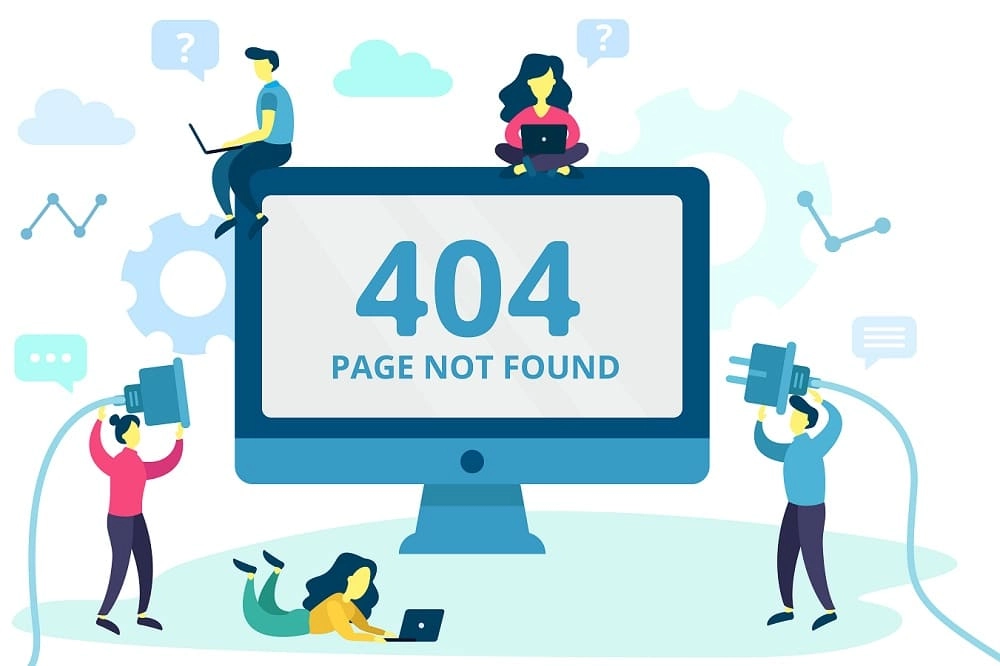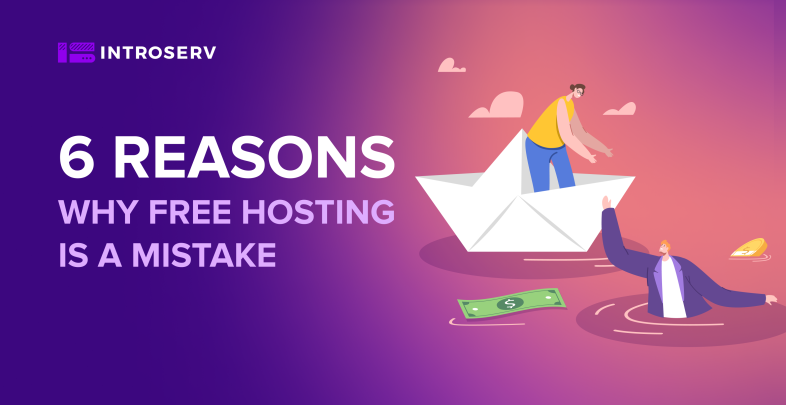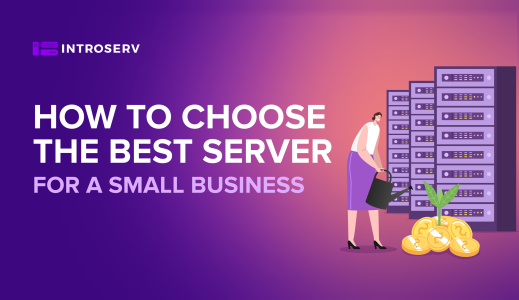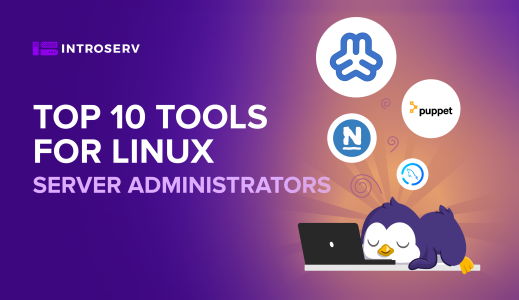You probably do not think that choosing the right web hosting service provider can affect the success of your business. In reality, during every stage of your project development, even the smallest details matter.
None will deny the fact that the look and feel of a website's functionality plays a crucial role in attracting and retaining customers. Still you should also keep in mind that the type of hosting (free or paid one) also plays an important role in building a successful online project.
Many website owners, when trying to reduce costs, tend to choose free hosting for their sites. Yet, as you know, there is an old adage “buy cheap, buy twice”. This saying is worth particular consideration when it comes to sourcing hosts for your website as any attempt to save costs while choosing a free web host can lead to aggravating results. The most efficient way to spend the budget allocated to the creation of a website - is to carefully plan all the expenditures at all stages of your projects development.
Getting an affordable and high-quality hosting solution isn't always easy. Outstaffing can be a cost-saving option. (Outstaffing means hiring specialists remotely from another country, such as programmers, web designers, etc). However, despite reducing the cost of website development, this method has its flaws and cannot be used in all cases.
Now let's return to the issue of choosing a reliable hosting company that can meet your business's needs. Since your choice of hosting can affect the performance of your site and, consequently, can affect the performance of your business. We recommend that you become familiar with the potential failures that you might encounter when choosing your hosting provider.
What is the biggest mistake you make when choosing your hosting provider? Practice shows that the most common mistake companies make in developing their online projects is choosing a free web host.
What makes hosting providers so important?
In order to design a proper website and make it run, there is a lot of work to be done. Finding a reputable web hosting company is indisputably the most important step in maintaining a positive online image. Of course, if you put your project on free hosting, you will automatically discard any chance of receiving high quality service traditionally offered by a reputable hosting company.
After the design of your website is complete, the development process begins. To make it possible for your customers to access your content quickly, you need a spacious data storage system. Hosting companies are the only ones that provide such services. Remote servers process information and provide access to data that is stored either on your computer or on other computers in your network. Essentially, the hosting provider's main job task is to make sure that your site's content can be accessed quickly by its visitors.
As is well known, businesses measure their success by the income they receive, and the owners aim to increase that income. By using this approach, online project management teams strive to eliminate any factors that may negatively affect your company's profit margin. It is said by many businessmen that if there is no business on the Internet today, there is no business at all.
Since the online marketplace is incredibly competitive, every small thing that can influence your project’s position in search results, and, accordingly, position it higher than that of your competitors, must be considered.
The choice of the right hosting company is one of the factors that matter. The wrong choice of server hosting service provider may negatively affect the speed of your website. Slower websites are ranked lower in search engine results. Then there are increased security risks and even hacker attacks. How can you know you're getting the best price-quality ratio with the hosting you've chosen?
The key reasons why free website hosting is a mistake
Placing your site on someone else's server is, of course, something that shows a great deal of appeal. Given all the expenditures that businesses face, it seems like a great way to save money on hosting. However, the reality differs from what most business owners expect. Not only is it impossible to save money, but you may end up spending more than if you initially chose paid hosting.
Plus the losses are not only material! By choosing free hosting you put at risk the safety of your content, personal user information, and the reputation of the web project. In the end, the outcome can lead to a decrease in income.
One of the basic nuances of free web hosting - it is a combination of well thought-out marketing strategies and techniques used to attract potential customers (site owners). Carefully planned tactics make it increasingly difficult for website owners to turn down free hosting service offers!
Luckily, it’s easy to reject all the free hosting offers. While also not paying a lot for all the fabulous amounts of functionality that you might need for your website to function normally. Today, you can choose from a wide range of hosting providers that offer premium services at quite reasonable prices. Switching to a paid hosting provider will not only save you money, but also eliminate the risk of losing customers due to poor quality services offered by free hosts.
What exactly are the situations in which free hosting can negatively impact your website? What are the main problems experienced online business owners are trying to avoid? Below are some of the main reasons why people give up on free hosting and end up making a serious mistake that can cause them to lose big profits or even bring an entire business to an end.
1. Is everything really free?
Think about whether something you received for free was truly free. Does a seemingly free product include any hidden charges or future fees? If something is being offered free of charge, make sure it will remain so for the entire period of time. Don't forget that there may be restrictions.
The first major problem related to free website hosting is that there are often restrictions on the use of functionality. Once you discover these limitations and realize that you need more functionality to fully operate your site, you will face one of two possible scenarios. In the first scenario, you will have to pay for resources used over and above the free rate. If you opt for a second scenario and only use features of a free version, you can significantly limit the performance of your website, resulting in a questionable project outcome.
The amount of memory available for your website is significantly limited with most free hosting providers. File Transfer Protocol access and bandwidth are not much better. If you choose free hosting, you're likely to sign a long-term contract, and if resources (such as server memory or bandwidth) need to be expanded during this period of time. The hoster will charge you considerably more.
If you compare a "free" hosting provider with a paid one, you may find out that the free one is actually much more expensive than the paid one as it might have hidden fees. Moreover, if you didn't read the small text printed at the bottom of your free hosting contract (which usually notifies you about extra costs may be incurred under certain circumstances), it is highly unlikely that you will be able to leave your free hosting provider without paying extra.
2. Problems with reliability

A lot of free hosting providers are young companies, and they invest huge budgets to promote their services. In fact, they give free hosting in exchange for attracting new customers, who in the future may become paying customers. Since premium paid hosting companies offer affordable packages, free hosting providers attract customers with a free basic package and a high price for additional options.
The key risk associated with hosting your site on the servers of a young free hosting company is the low reliability of the provider of such services.
What is to be feared in case a young free hosting provider will not withstand the pressure of competitors and close down? As sad as it sounds, you will lose everything. If they close, then your web project closes, too. In the end, all work on the creation, content and promotion of the site can be lost forever.
The situation is exacerbated by the fact that most site owners do not keep copies of their web projects. Web hosting providers (no matter if they are young or are approved hosts) most often offer the purchase of server capacity, along with a domain name for the site. If you use the services of a young unapproved hosting company, when it is closed, you will lose your domain. This situation related to domain change can have an extremely negative effect on the SEO-promotion of your project. All the time and money you have invested in the creation and development of your website will be irretrievably lost.
3. You will not be able to move your site
The majority of hosting companies that offer free website maintenance services have a lot of restrictions listed in their contracts. In this case, site owners believe that they are in sole control of their projects, but this is not always true. The truth is, your content will most likely not belong to you, but to your hosting provider. This means you won't have the ability to sell your site, share your content with third parties, or publish your work on other resources.
This is especially important for creative individuals (artists, photographers, etc.) who create and keep portfolios of their work on the site. As soon as such content is submitted to a free hosting site, all rights to your works are transferred to the providers, and you no longer be their owner.
The situation will get worse if you want to move your project to a hosting service provider with an extended package. In this case, it is almost impossible to move the site. Practically the only option in this case is to agree to pay for expensive extended options from your provider. Due to the fact that you are not reflected in the documents as the owner of your own content and even a domain hosted on a free server, you will not be able to move to another service provider.
4. You do not have access to the server management
Using free hosting means that you get access to what you paid for, but since you did not pay for the server, you will have limited access to it. In practice, it may not be possible to scale your site, that is, the project will not be able to expand as your business grows.
Most free hosting providers cannot boast of a high server speed, which means they won't be able to handle a large number of visitors quickly. At the beginning, having a large amount of customers isn’t so important because your customer flow is still small. Yet with time, when you will get more visitors, you may encounter some serious issues. As a result, the speed of processing requests for the site to the server will drop significantly, which will inevitably cause visitors to leave. The loss of customers will obviously result in a loss of revenue, which could seriously damage your online reputation.
Paying for hosting isn't as expensive as it might seem at first glance. By investing in hosting, you are investing in the security of your website as well as a prosperous future for your business. If your project expands after being placed on paid hosting and needs more resources for its work, you can purchase all the necessary resources without paying too much. By using this approach, you can be sure that your site's speed won't decrease and there won't be any server downtime. Which if this occurs, can discourage customers from using your service and, in some cases, result in loss of customers.
5. Your site will look unprofessional

As you probably already know, nothing is free. The truth is - free hosting does not allow you to customize your site's design and functionality, so you will be limited to using only basic themes. Yes, you can make small changes to your site with free hosting, but you can't fully customize the site or improve it as much as you would like. In addition, you will be offered a range of domain names that may not be appropriate for your needs, and, most likely, will be subdomains.
CMS WordPress is a great example of how to create your website for free. WordPress greatly reduces your potential capabilities, and because of this your online project will not look professional. Customers who use free WordPress hosting, provide a domain of the form biz.wordpress.com. A paid hosting provider, on the other hand, will offer you a good top-level domain at a very reasonable cost, and you will be able to create professional emails that will make your business project look more professional.
Free hosting does not allow you to install plugins that add many new features to your site, so your project will not run at its full speed. Furthermore, you need to consider that free hosted sites can't run online stores or send newsletters. Besides restrictions, you are also likely to see forced advertising on your site that does not pertain to your business. After all, the provider, luring customers with free hosting, needs to somehow recoup their costs and make money.
6. You will have problems with SEO promotion
As you learned previously, your site may load slowly, downtime may increase, and the design and functionality will be less than ideal if you are using free hosting. All of these points will negatively affect the end result, namely attracting users to the project and generating profit from them.
Remember SEO promotion is a science in itself. Plus it takes time to gain a strong position on the Internet if you invest in SEO optimization and promotion. When your free hosting provider shuts down your site, you may not only lose all your gains, but your search engine ranking may suffer as well.
In order to start a serious project and promote it on the network, you need to give up free hosting. At first glance, a free hosting service may seem like a good way to save money, but in the end it will lead to a loss of customers and a decrease in income. Keep in mind: Your site should look professional from beginning to end.
The best hosting providers give their customers the ability to manage their sites, maximize SEO optimization, utilize any available domain, and scale their projects as their business grows. By choosing a reliable hosting provider, you're already contributing to your brand's growth. By getting a professional Internet presence from a paid hosting provider, you have the best chances of success.






















































